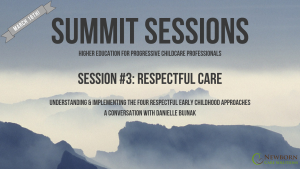We are thrilled to announce Summit Session #3 which will take place in our private Facebook group on March 16th at 9am (PST)/12pm (EST). For this months live stream we’re delighted to speak with the talented Danielle Bujnak, a well-known early childhood education expert, and current course developer with Newborn Care Solutions, to discuss ‘Respectful Care’.
Click the image above, or the banner at the bottom of this page to join Summit Sessions and begin participating today!
What do Steiner/Waldorf®, Montessori, RIE®/Pikler®, and Reggio Emilia all have in common? They are each known as one of the four main approaches in ‘Respectful Care’, a movement driven towards the healthy development of children, utilizing scientific research and classical knowledge of infant brain development and emerging research in neuroscience.
Our friends at Newborn Care Solutions have created an entire course dedicated to deepening your understanding of ‘Respectful Care’ with an exceptional early childhood educator, Danielle Bujnak. For Summit Session #3, we are thrilled to welcome Danielle who will offer us an insiders look at this remarkable course.
Defining The Terms
These four educational approaches fall under an umbrella referred to as alternative education, a general term encompassing many different approaches to teaching and learning, differing from that of the mainstream method of teaching employed in a culture. Alternative learning environments are found within state, charter, and private schools as well as home-based learning environments.
Your nanny families may choose to investigate alternative education for a variety of reasons, sometimes they are pursuing a learning environment that mirrors their ethos and worldview more than standard public education. Sometimes the reason has more to do with their lifestyle, for instance in the case of traveling musicians the parents may be interested in developing a learning environment for their kids that allows them to travel on the road with them. High-profile families may choose to educate their children in alternative ways as a protection and extension of their own privacy.
There are multiple ways to support, nurture, and challenge kids with their educational goals outside of the typical public school. There are private schools that are founded on particular learning philosophies like Montessori, Waldorf, and Reggio-Emilia, and then there are home-based learning philosophies like Unschooling, and lastly, there’s the streamlined international curriculum of World Schools. To better understand why parents might choose to explore these educational options for their children, let’s take a moment to dig into each of these philosophies a bit deeper.

Montessori
Montessori schools are a system of education for young children that seek to develop natural interests and activities rather than using formal teaching methods. Developed by physician and educator Maria Montessori, the Montessori educating style was based on teaching independence, freedom within limits, and respect for a child’s natural psychological, physical, and social development. Although a range of schools exist under the name “Montessori,” the Association Montessori Internationale (AMI) and the American Montessori Society (AMS) cite these elements as essential:
- Mixed age classrooms; classrooms for children ages 2 1⁄2 or 3 to 6 years old are by far the most common, but 0-3, 6-9, 9-12, 12-15, and 15-18-year-old classrooms exist as well.
- Student choice of activity from within a prescribed range of options
- Uninterrupted blocks of work time, ideally three hours
- A constructivist or “discovery” model, where students learn concepts from working with materials, rather than by direct instruction
- Specialized educational materials developed by Montessori and her collaborators
- Freedom of movement within the classroom
- A trained Montessori teacher

Steiner/Waldorf
Waldorf education (also known as Steiner education), is based on the educational philosophy of Rudolf Steiner, the founder of anthroposophy. The structure of Waldorf education follows Steiner’s theory of child development which divides childhood into three developmental stages and describes learning strategies appropriate to each learning stage. These stages, each of which lasts approximately seven years, are somewhat similar to those described by clinical psychologist Jean Piaget. The main facets of Waldorf philosophy in the early childhood stages are centered on creating rhythm and predictability within the educational environment so that the school feels like a safe, comfortable extension of the home. The stated purpose of this approach is to awaken the ‘physical, behavioral, emotional, cognitive, social, and spiritual’ aspects of each individual, fostering both creative and analytic thinking. A 2005 review by the UK Department for Education and Skills found that Waldorf schools successfully develop ‘creative, social and other capabilities important to the holistic growth of the person’.
Where is the book in which the teacher can read about what teaching is? The children themselves are this book. We should not learn to teach out of any book other than the one lying open before us and consisting of the children themselves.
— Rudolf Steiner, Human Values in Education

Reggio Emilia
The Reggio Emilia approach is an educational philosophy focused on preschool and primary education. It was developed after World War II by a psychologist named Loris Malaguzzi along with parents in the villages around Reggio Emilia, Italy. Following the war, people believed that children were in need of a new way of learning. The assumption of Malaguzzi and the concerned parents was that people form their own personality during early years of development and that children are endowed with ‘a hundred languages’ through which they can express their ideas. The aim of this approach is to teach young children how to use these symbolic languages (e.g., painting, sculpting, drama) in everyday life. The program is based on the principles of respect, responsibility, and community through exploration + discovery in a supportive and enriching environment, based on the interests of the children through a self-guided curriculum.
![]()
RIE/Pikler
Emmi Pikler, a pediatrician, took over the running of a Home for Children (known as Loczy) in Budapest in 1946. Over the course of her career, she mentored Magda Gerber who eventually took Pikler’s philosophy to the USA. Emmi Pikler died in 1984 and Magda Gerber in 2007. Their work, however, lives on in so many throughout the world. Pikler set an example that the world is just beginning to wake up to. She knew that in order for babies to develop perfectly in the way that nature had intended, certain things must be acknowledged. These included:
- The long term impact of free movement on a baby’s spirit, intelligence, and physical being.
- Respect being shown to babies at all times – and clarifying what that entailed.
- The importance of a way a baby is touched and supported in the important birth to two years period.
- That no babies need help to reach their milestones in life. We can, however, support them with patience. Pikler said, “As a matter of principle, we refrain from teaching skills and activities which, under suitable conditions, will evolve through the child’s own initiative and independent activity.”

We can’t wait to learn more about these incredible philosophies, and the fantastic course from Newborn Care Solutions at Summit Session #3 with Danielle Bujnak on March 16th at 9am PST / 12pm EST. Click the button below to participate!
Have you ever incorporated other educational philosophies into your best practices as a caretaker? We’d love to hear your experiences – reach out to us on Facebook, Instagram, and check out the other posts on the blog!
Are you looking for an exceptional nanny or private educator? Get in touch!
Do you have what it takes to be an Adventure Nanny? Apply Now!


